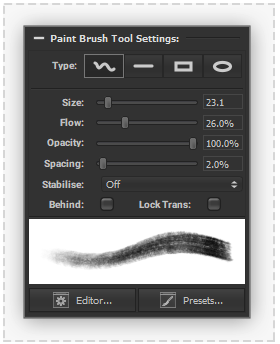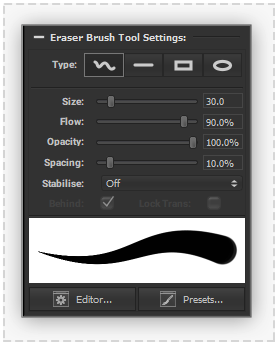Canvas Brush Tools: Difference between revisions
No edit summary |
No edit summary |
||
| (5 intermediate revisions by the same user not shown) | |||
| Line 15: | Line 15: | ||
The 'Canvas Tools' brush settings provide the most regularly used settings. Most of these settings are shared between the brush tools, they are outlined below: | |||
The 'Canvas Tools' Palette brush settings provide the most regularly used settings. Most of these settings are shared between the brush tools, they are outlined below: | |||
| Line 45: | Line 46: | ||
|} | |} | ||
====Type==== | ====Type==== | ||
| Line 55: | Line 55: | ||
* '''Rectangle:''' Dragging the cursor between two points in the canvas view will produce a rectangle comprising of brush stamps at regular intervals. A dashed line is provided during tool interaction to indicate where the output stamps will be produced. Holding the Shift key during tool interaction will snap the produced rectangle to be a square. | * '''Rectangle:''' Dragging the cursor between two points in the canvas view will produce a rectangle comprising of brush stamps at regular intervals. A dashed line is provided during tool interaction to indicate where the output stamps will be produced. Holding the Shift key during tool interaction will snap the produced rectangle to be a square. | ||
* '''Oval:''' Dragging the cursor between two points in the canvas view will produce an oval comprising of brush stamps at regular intervals. A dashed line is provided during tool interaction to indicate where the output stamps will be produced. Holding the Shift key during tool interaction will snap the produced rectangle to be a circle. | * '''Oval:''' Dragging the cursor between two points in the canvas view will produce an oval comprising of brush stamps at regular intervals. A dashed line is provided during tool interaction to indicate where the output stamps will be produced. Holding the Shift key during tool interaction will snap the produced rectangle to be a circle. | ||
====Size==== | |||
The size control specifies the maximum diameter of brush stamps in pixels. If a pressure-sensitive input device is used and pressure sensitivity settings are active then the radius of brush stamps may be smaller than this specified radius. | |||
====Flow==== | ====Flow==== | ||
| Line 63: | Line 67: | ||
The opacity level controls the transparency of the complete brush stroke. An opacity level lower than 100% provides maximum strength of the brushstroke, a lower opacity will not allow any element of a brushstroke to be above the specified opacity even if the same area interacts with multiple times. | The opacity level controls the transparency of the complete brush stroke. An opacity level lower than 100% provides maximum strength of the brushstroke, a lower opacity will not allow any element of a brushstroke to be above the specified opacity even if the same area interacts with multiple times. | ||
====Spacing==== | ====Spacing==== | ||
| Line 82: | Line 82: | ||
====Lock Transparency (Paint Only)==== | ====Lock Transparency (Paint Only)==== | ||
When active the paintbrush output will be | When active the paintbrush output's transparency will be restricted to the corresponding areas transparency in the current layer. | ||
====Brush Editor Toggle | ====Brush Editor & Brush Presets Toggle Buttons==== | ||
Pressing these buttons will toggle the display of the [[Brush Editor]] or [[Brush Presets]] Palette windows. | |||
Latest revision as of 22:16, 6 June 2020
PanelForge provides 'Paint' and 'Erase' brush-type tools. These tools are based around an advanced common brush engine with highly adjustable brush settings which can be saved and restored as 'Brush Presets'.
A brushstroke is composed of a series of small 'stamps' that are 'spaced' apart at regular intervals to form the illusion of a continuous stroke.
Adjusting the settings of how and where these brush stamps are produced can simulate a multitude of brush styles, ranging from simple solid pens to complex textured paint like brushes. Many of these settings should be familiar to users of other drawing software, PanelForge provides the ability also import settings from the 'Adobe Photoshop' ABR brush file type.
PanelForge includes additional 'Palettes' to adjust and manage brush settings used with the 'Paint' and 'Erase' tools:
- Brush Editor - Adjust the full range of the current Brush Tool settings.
- Brush Presets - Manage Preset Brush Tool Settings. Import brush preset files (including 'Adobe Photoshop' ABR brush file type) and export brush preset files.
The 'Canvas Tools' Palette brush settings provide the most regularly used settings. Most of these settings are shared between the brush tools, they are outlined below:
|
|
Type
Four brush types are provided that produce different results when using the cursor to interact with the canvas view.
- Freeform: Clicking and dragging the cursor in the canvas view will produce brush stamps under the cursor at regular intervals as it is moved.
- Line: Dragging the cursor between two points in the canvas view will produce a line comprising of brush stamps at regular intervals. A dashed line is provided during tool interaction to indicate where the output stamps will be produced. Holding the Shift key during tool interaction will snap the produced line to Horizontal or Vertical orientation.
- Rectangle: Dragging the cursor between two points in the canvas view will produce a rectangle comprising of brush stamps at regular intervals. A dashed line is provided during tool interaction to indicate where the output stamps will be produced. Holding the Shift key during tool interaction will snap the produced rectangle to be a square.
- Oval: Dragging the cursor between two points in the canvas view will produce an oval comprising of brush stamps at regular intervals. A dashed line is provided during tool interaction to indicate where the output stamps will be produced. Holding the Shift key during tool interaction will snap the produced rectangle to be a circle.
Size
The size control specifies the maximum diameter of brush stamps in pixels. If a pressure-sensitive input device is used and pressure sensitivity settings are active then the radius of brush stamps may be smaller than this specified radius.
Flow
The flow level controls the transparency of each individual brush stamps. A flow level of 100% will provide a strong brushstroke, a lower flow level will provide a more natural fluid brush stroke.
Opacity
The opacity level controls the transparency of the complete brush stroke. An opacity level lower than 100% provides maximum strength of the brushstroke, a lower opacity will not allow any element of a brushstroke to be above the specified opacity even if the same area interacts with multiple times.
Spacing
The spacing level control specifies the spacing between brush stamps based on a brush stamps current radius. A level of 100% will cause no brush stamp overlapping, a low spacing level will cause the brush to overlap more tightly.
Stabilisation
Causes the removal of unstable movements in the brushstroke by limiting the maximum sample rate of cursor movement producing smoother brush curves.
Behind (Paint Only)
When active the paintbrush output will be composited below the current layer pixel data.
Lock Transparency (Paint Only)
When active the paintbrush output's transparency will be restricted to the corresponding areas transparency in the current layer.
Brush Editor & Brush Presets Toggle Buttons
Pressing these buttons will toggle the display of the Brush Editor or Brush Presets Palette windows.



